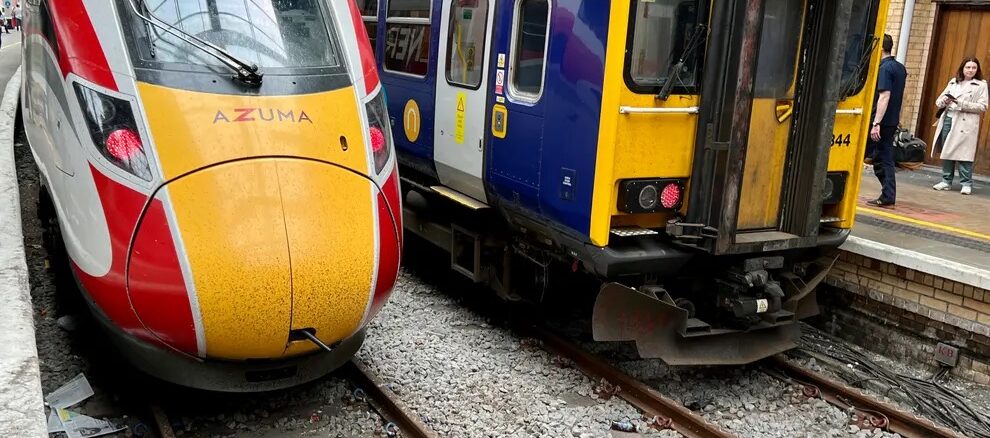
Canadians travelling to London especially into Garrick Airport – beware UK rail workers have voted overwhelmingly to strike in a dispute over jobs, pay and conditions, the RMT union has announced.
The result was announced within four hours of the ballot of more than 40,000 UK railway workers closing.
The RMT said: “Railway workers have voted overwhelmingly in favour of strike action across Network Rail and the train operating companies, in the biggest endorsement for industrial action by railway workers since privatisation.”
Eddie Dempsey, assistant general secretary of the RMT, “Some of our members are in the third year of a pay freeze.
“Most of our membership is on around £24,000.
Tube strike threatened for day after Jubilee weekend
“We kept this country moving during the pandemic.
“We don’t think it’s unreasonable to say RPI is at 11.1 per cent, we want a pay rise.”
Of the 71 per cent of those eligible to vote, 89 per cent backed a strike – representing 63 per cent of the workforce balloted, and more than 25,000 workers.
RMT members working for Network Rail and 14 out of 15 of the train operators voted for “strike action and action short of strike”.
The train operators whose RMT members voted to strike include Avanti West Coast, Greater Anglia, GWR, LNER, Northern and South Western Railway.
A combination of Network Rail signallers and train staff walking out could close down much of the rail network.
LNER issued a statement saying: “We are aware of potential industrial action announced by the RMT. We will be reviewing the outcome of this proposed industrial action and will provide updates on how this might impact LNER services.”
Staff working for GTR – covering Southern, Thameslink, Gatwick Express and Great Northern – voted only in favour of “action short of strike”.
The general secretary of the RMT, Mick Lynch, called the vote “a vindication of the union’s approach” that “sends a clear message that members want a decent pay rise, job security and no compulsory redundancies”.
He said: “Our NEC [National Executive Committee] will now meet to discuss a timetable for strike action from mid-June, but we sincerely hope ministers will encourage the employers to return to the negotiating table and hammer out a reasonable settlement with the RMT.
At the same time, the union says it is “demanding urgent talks with Network Rail and the 15 train operating companies that were balloted to find a negotiated settlement to the dispute over pay, jobs and safety”.
Andrew Haines, Network Rail’s chief executive, said: “The RMT has jumped the gun here as everyone loses if there’s a strike.
“As a public body we have been working on offering a pay increase that taxpayers can afford, and we continue to discuss this with our trades unions.
“We urge the RMT to sit down with us and continue to talk, not walk, so that we can find a compromise and avoid damaging industrial action.
“We are at a key point in the railway’s recovery from the pandemic. The taxpayer has provided the industry with £16bn worth of additional life support over the last two years and that cannot continue. Travel habits have changed forever and the railway has to change as well to adapt to this new reality.
“Any industrial action now would be disastrous for our industry’s recovery and would hugely impact vital supply and freight chains. It would also serve to undermine our collective ability to afford the pay increases we want to make.”
Steve Montgomery, group chair of the Rail Delivery Group, representing train operators, said: “Our railways must adapt to attract more passengers back and reduce our running costs. It is not fair to ask taxpayers to continue to shoulder the burden when there are other vital services that need public support.
“Nobody wins when industrial action threatens to disrupt the lives and livelihoods of passengers and businesses and puts the industry’s recovery at risk. We urge the RMT leadership to behave responsibly, and to talk to us to find a way to avoid damaging industrial action and secure the long-term future of the industry.”
“Every business wants to support its staff and the railway is no exception. All train operators want to offer their staff a pay rise and are working hard to make that happen. But, as an industry, we have to change our ways of working and improve productivity to help pay our own way.
“The alternatives of asking taxpayers to shoulder the burden after government has contributed over £16bn to the industry during Covid, or asking passengers to pay even higher fares when they too are feeling the pinch, simply isn’t fair.”

Be the first to comment